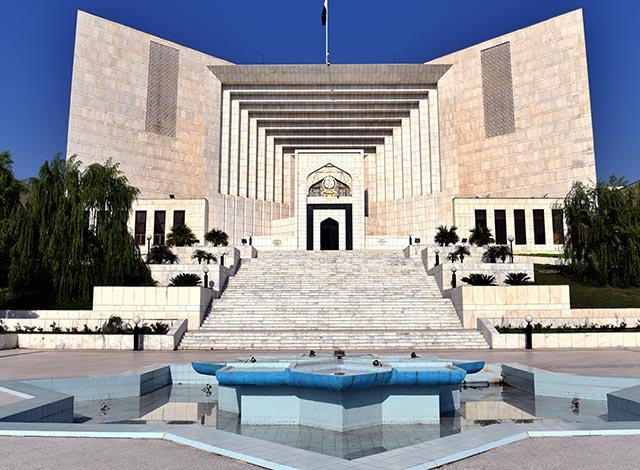Supreme Court annuls trials of civilians in military courts. The Supreme Court issued a landmark decision on Monday declaring trials of civilians in military courts to be unconstitutional.
The Pakistan Tehreek-e-Insaf (PTI) leader Imran Khan’s arrest in a corruption case sparked riots on May 9, which led to the Supreme Court announcing that it would reserve judgment on petitions challenging the military trial of civilians involved in those riots.
The petitions submitted by the PTI leader and others were heard on Monday by a five-member apex court bench, which also included Justices Munib Akhtar, Yahya Afridi, Sayyed Mazahar Ali Akbar Naqvi, and Ayesha Malik.
Following the conclusion of Attorney General of Pakistan (AGP) Mansoor Usman Awan’s arguments regarding the jurisdiction and authority of the military courts to try civilians in accordance with the Army Act, the decision was reserved.
Trials of civilians had already started before the top court’s ruling in the case, petitioner lawyer Salman Akram Raja informed the bench at the beginning of today’s hearing.
Justice Ahsan responded by saying that the method of the case’s proceedings would be decided after Attorney General of Pakistan (AGP) Mansoor Usman Awan finished his arguments.
The AGP stated that he would explain to the court why a constitutional amendment was required to establish military courts in 2015 in order to prosecute the terrorists before he presented his arguments.
AGP Awan responded to Justice Ahsan’s question by stating that both local and foreign defendants were tried in military courts.
He declared that the accused would be tried in accordance with Section 2 (1) (D) of the Official Secrets Act and that a trial conducted in accordance with the Army Act would satisfy all legal requirements.
The AGP stated that “the trial of the May 9 accused will be held in accordance with the procedure of a criminal court.”
The AGP claimed that the 21st Amendment was approved because the Army Act did not apply to terrorists.
“Amendment was necessary for the trial of terrorists [then] why amendment not required for the civilians? At the time of the 21st constitutional amendment, did the accused attack the army or installations?” inquired Justice Ahsan.
AGP Awan replied that the 21st Amendment included a provision to try accused involved in attacking restricted areas.
“How do civilians come under the ambit of the Army Act?” Justice Ahsan asked the AGP.
Justice Malik asked AGP Awan to explain what does Article 8 of the Constitution say. “According to Article 8, legislation against fundamental rights cannot be sustained,” the AGP responded.
Justice Malik observed that the Army Act was enacted to establish discipline in the forces. “How can the law of discipline in the armed forces be applied to civilians?” she inquired.
The AGP responded by saying that discipline of the forces is an internal matter while obstructing armed forces from discharging duties is a separate issue.
He said any person facing the charges under the Army Act can be tried in military courts.
“The laws you [AGP] are referring to are related to army discipline,” Justice Ahsan said.
Justice Malik inquired whether the provision of fundamental rights be left to the will of Parliament.
“The Constitution ensures the provision of fundamental rights at all costs,” she added.
Justice Malik argued that if the court allowed this, even someone who disregarded a traffic signal would lose his fundamental rights.
Court-martials are not recognized as established courts under Article 175 of the Constitution, the AGP informed the bench.
Justice Ahsan then stated that courts established under the Constitution and Law rather than Article 175 govern court martials.
The bench reserved judgment on the petitions after hearing the arguments.
The federal government had informed the Supreme Court a day earlier that the military trials of civilians had already started.
Justice Ahsan suggested that he would issue a brief order on the petitions after the hearing was finished.
As the Supreme Court annuls trials of civilians in military courts, following orders from the top court on August 3, the government informed the court of the development regarding trials in the military court in a miscellaneous application, highlighting the fact that at least 102 people had been detained as a result of their involvement in the attacks on military installations and establishments.
